Roman wrote:As much as it may care to recreate history, Hollywood can't help reflecting its own era with its attitudes and prejudices. Any historical tale, no matter how well-intentioned, will always tell us more about the writer's era than the time period being described.
We've gotten well away from the original thread, but I think this is an important distinction.
I (and I'm sure many others on this list) have periodically encountered various groups decrying certain films of the past because of their lack of political correctness. In 2003, I attended the annual convention of the Al Jolson Society in Long Beach, and there was an article in the newspaper saying that because of his blackface work, Al Jolson was an embarassment and better forgotten. (Jolson is my favorite singer.)
More recently, there was a movement to cancel a Charlie Chan movie marathon on TMC or a similar network. And for a while it was successful, claiming that it was very derogatory (sp?) to Asians.
And, of course, there's the periodic person who'll criticize the Benny show for having an African-American as a servant.
Hollywood is out to make money. So given the choice between historical accuracy and presenting something that will "play" to the sensibilities of the current audience, they'll choose the latter. It seems that your
average audience member is a) not going to be very well-informed about the historical context, and therefore b) not going to be able to interpret the various attitudes in the context of the movie's time period. A person looking at the Benny show now may say that it's "bad" to have Rochester, not realizing that the portrayal was actually quite revolutionarily positive in its own time. Same thing for Amos n Andy (c.f., The Original Amos n Andy
http://www.midcoast.com/~lizmcl/aa.html).
On a non-racial point, I recently saw the movie "Chicago" and was laughing at all the cathedrale radios in it. The movie is supposed to be in the late 20s, and cathedrales didn't start coming in until 1931 at the earliest (and more like 1933-34 for the ones they were showing). But if you showed a 1927 radio, a modern audience probably wouldn't know what it was (long, rectangular metal or wood box). So it's not historically accurate, but you show something that doesn't need explaining.


 Oh, for heaven's sake!
Oh, for heaven's sake!